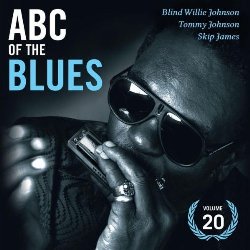ABC of the Blues CD20 (2010)
ABC of the Blues CD20 (2010)

CD 20 – Blind Willie Johnson, Tommy Johnson & Skip James 20-01 Blind Willie Johnson – Dark Was the Night, Cold Was the Ground 20-02 Blind Willie Johnson – If I Had My Way I’d Tear the Building Down 20-03 Blind Willie Johnson – Praise God I’m Satisfied 20-04 Blind Willie Johnson – Trouble Will Soon Be Over 20-05 Blind Willie Johnson – I Know His Blood Can Make Me Whole play 20-06 Blind Willie Johnson – Everybody Ought to Treat a Stranger Right 20-07 Blind Willie Johnson – It’s Nobody’s Fault but Mine 20-08 Blind Willie Johnson – I’m Gonna Run to the City of Refuge 20-09 Blind Willie Johnson – Keep Your Lamp Trimmed and Burning 20-10 Blind Willie Johnson – Jesus Make Up My Dying Bed 20-11 Tommy Johnson – Cool Drink of Water Blues 20-12 Tommy Johnson – Maggie Campbell Blues [See See Rider] 20-13 Tommy Johnson – Canned Heat Blues 20-14 Tommy Johnson – Big Road Blues 20-15 Tommy Johnson – Alcohol and Jake Blues 20-16 Skip James – If You Haven’t Any Hay Get On Down the Road 20-17 Skip James – 22-20 Blues play 20-18 Skip James – How Long “Buck” 20-19 Skip James – Cypress Grove Blues 20-20 Skip James – Devil Got My Woman
"Blind" Willie Johnson (January 22, 1897 – September 18, 1945) was an American singer and guitarist, whose music straddled the border between blues and spirituals.
While the lyrics of all of his songs were religious, his music drew from both sacred and blues traditions. His music is distinguished by his powerful bass thumb-picking and gravelly false-bass voice, with occasional use of a tenor voice. His father would often leave him on street corners to sing for money. Tradition has it that he was arrested for nearly starting a riot at a New Orleans courthouse with a powerful rendition of "If I Had My Way I'd Tear The Building Down", a song about Samson and Delilah.
Johnson made 30 commercial recording studio record sides in five separate sessions for Columbia Records from 1927–1930. On some of these recordings Johnson uses a fast rhythmic picking style, while on others he plays slide guitar. According to a reputed one-time acquaintance, Blind Willie McTell (1898–1959), Johnson played with a brass ring, although other sources cite him using a knife. However, in enlargement, the only known photograph of Johnson seems to show that there is an actual bottleneck on the little finger of his left hand. While his other fingers are apparently fretting the strings, his little finger is extended straight—which also suggests there is a slide on it as well.
Tommy Johnson (1896 – November 1, 1956) was an influential delta blues musician. He was born in Terry, Mississippi, and lived most of his life in Crystal Springs, Mississippi. Tommy Johnson was known to tell a story about how he had sold his soul to the devil in exchange for his mastery of blues guitar. This story closely resembles the same legend of Robert Johnson. Robert Johnson, however, was never known to tell this story and it was most likely a rumor started by Son House in the 1960s, long after both Johnsons were dead.
Tommy Johnson was influenced by Charlie Patton. Johnson was accompanied by Papa Charlie McCoy. Johnson’s “Big Road Blues” inspired Canned Heat’s masterpiece, “On The Road Again”. The origin of his acclaimed song can be debated as many similar songs were recorded under other contemporary artists as “Stop and Listen Blues” and “Wait and Listen” although his is the earliest known recording to the melody.
In the 2000 movie O Brother, Where Art Thou? there is a character named Tommy Johnson (played by Chris Thomas King) who sold his soul to the devil to play guitar. He plays the background for the Soggy Bottom Boys (a band that the main characters in the movie are in) on “Man of Constant Sorrow”.
Nehemiah Curtis "Skip" James (June 9, 1902 – October 3, 1969[2]) was an American Delta blues singer, guitarist, pianist and songwriter, born in Bentonia, Mississippi, died in Philadelphia, Pennsylvania.
He first learned to play guitar from another bluesman from the area, Henry Stuckey. His guitar playing is noted for its dark, minor sound, played in an open D-minor tuning with an intricate fingerpicking technique. James first recorded for Paramount Records in 1931, but these recordings sold poorly due to the Great Depression, and he drifted into obscurity. After a long absence from the public eye, James was "rediscovered" in 1964 by three blues enthusiasts, helping further the blues and folk music revival of the 1950s and early 60s. During this period, James appeared at several folk and blues festivals and gave live concerts around the county, also recording several albums for various record labels.
James is sometimes associated with the Bentonia School, which is either a sub-genre of blues music or a style of playing it. Calt, in his 1994 biography of James, I'd Rather Be the Devil: Skip James and the Blues, maintains that there was indeed no style of blues that originated in Bentonia, and that this is simply a notion of later blues writers who overestimated the provinciality of Mississippi during the early 20th century, when railways linked small towns, and who failed to see that in the case of Jack Owens, "the 'tradition' he bore primarily consisted of musical scraps from James' table". Owens and other musicians who may have been contemporaries of James were not recorded until the 60s revival period. As such, the extent to which the work of said musicians is indicative of any "school", and whether James originated it or was simply a "member", remains an open question.
download (mp3 @320 kbs):
yandex 4shared mediafire ulozto gett bayfiles
Zmieniony (Niedziela, 25 Sierpień 2019 19:18)








